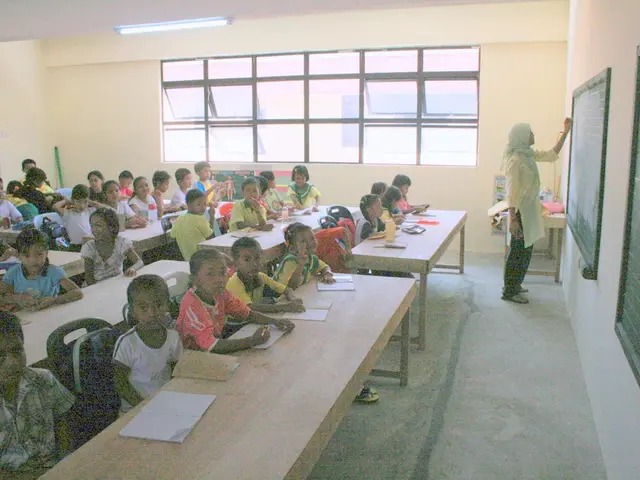Mental Health Care Through All Stages of Life - From Childhood to Elderhood
Mental Health Matters: Navigating Life's Stages Together
Emotional health is the anchor that steers us through life's choppy waters, building relationships that are wholesome and fulfilling. Unlike physical health, which often grabs headlines, mental health maintenance calls for consistent care throughout our life journey. As we transition from one stage to another, our mental health requirements adapt to the unique challenges each phase presents.
In various communities, localized approaches to mental health care have been recognized as the key to meeting these diverse needs. Comprehending the evolution of mental health across life stages is essential for professionals, families, and policymakers. Let's delve deeper into this topic as we explore how mental health develops at different stages:
Contents
- Revolutionizing Mental Health: Recent Advancements
- Childhood: The Foundation for Future Emotional Success
- Adolescence: Balancing Growth and Strife
- Young Adulthood: Navigating Life's Twists and Turns
- Midlife: Coping with Life's Pace and Pressure
- Later Years: Reimagining Aging and Emotional Well-being
- Mental Health and Relationships: A Lifelong Bond
- Empowering Through Education: Awareness and Action
Table of Contents
Shaking Up Mental Health: Novel Approaches in Care
As the scope of psychiatric Mental health care broadens, traditional models are being reinvented to encompass a broader assortment of life-stage-specific challenges. Integrative approaches are taking root, recognizing the intricate interplay between biology, the environment, and societal shifts that shape mental health.
So what's driving this revolution? Advancements in neuroscience have provided insights into developmental disorders in children, cognitive decline in older adults, and a myriad of other subjects, leading to more effective treatments[1][2].
For those eager to join the mental health field, a wealth of opportunities awaits, from child psychiatry to trauma-focused care[3]. Top-notch programs blend academic rigor with practical application, emphasizing digital tools like teletherapy to broaden access for underserved populations. These changes demonstrate a dedication to meeting patients where they are-physically, emotionally, and technologically.
Childhood: Setting the Stage for Emotional Mastery
Nurturing emotional development in children is of the utmost importance. As the brain matures and social environments expand, children form essential abilities like emotional regulation, social skills, and self-awareness[4].
Challenges like anxiety, ADHD, and trauma can disrupt this natural progression, but early identification and targeted interventions have proven highly impactful. Advances in play therapy[5] and cognitive behavioral techniques, tailored specifically for children, are paving the way for improved child mental health care.
Schools and community programs are integral in supporting children's mental health needs. Activities like mental health awareness days, peer mentoring programs, and mindfulness exercises are becoming commonplace in education.
Adolescence: Riding the Waves of Change
Adolescence is a period marked by added pressure, necessitating a double-pronged strategy that combines counseling and practical tools. Struggles like identity formation, academic performance, and social status increase the likelihood of anxiety and depression.
As a result, individuals in this phase are more likely to seek help, signaling a shift in cultural attitudes towards mental health care[6]. Mindfulness, cognitive-behavioral therapy, and digital applications are among the self-help tools becoming widely accessible to this generation.
Young Adulthood: Journeying Into the Unknown
Young adulthood is a time of exploration and self-discovery, yet it also brings a slew of mental health challenges. Struggles with anxiety, depression, social media influence, and financial pressures create a formidable mental load for this demographic.
Addressing these issues requires resilience-building and problem-solving interventions. Universities and workplaces are stepping up, offering resources like therapy, workshops, and helplines. The integration of traditional and modern approaches empowers young adults to confront this challenging period with confidence and emotional balance.
Midlife: Adapting to Life's Pace
Midlife often brings unique mental health challenges as individuals juggle career demands, family responsibilities, and personal health concerns. Stress from managing work-life balance, coping with aging parents, and preparing for children's independence can take a toll on emotional well-being.
Focusing on mental health in midlife requires a proactive and holistic approach. Mindfulness, counseling, and physical fitness are among the practices proving effective in maintaining emotional stability. Support groups and peer networks provide a space for individuals to share experiences and navigate challenges collectively.
Later Years: Aging Gracefully, Inside and Out
The mental health needs of older adults are often overlooked, yet they form a vital aspect of aging well. Seniors may face increased risks of loneliness, depression, and cognitive decline, especially after losing loved ones. However, community-based initiatives and specialized care services can make a significant impact.
Activities like senior yoga, book clubs, or art therapy offer emotional outlets and help combat isolation. Geriatric mental health services, such as counseling tailored for older adults or memory care services, ensure seniors receive the appropriate support as they navigate the complexities of aging.
Relationships and Mental Health: A Lifelong Connection
Relationships exert a powerful impact on mental health, influencing self-esteem, emotional resilience, and overall well-being. During childhood, supportive relationships contribute to trust-building and stress-management. In adulthood, strong bonds can help alleviate feelings of loneliness and anxiety. Familial and community involvement is essential in mental health support[7].
However, toxic or strained relationships can exacerbate mental health issues. Mental health professionals often encourage individuals to cultivate positive relationships and work on resolving interpersonal conflicts through counseling, therapy, or communication strategies.
Education and Awareness: Combatting Stigma and Promoting Support
Education and awareness are critical in improving mental health outcomes at all life stages. By destigmatizing mental health issues, individuals are encouraged to seek help. School, workplace, and community organizations can act as platforms for mental health education, enabling individuals to recognize signs of distress in themselves and others.
Raising awareness also leads to expanding access to resources and encourages proactive self-care. Campaigns that promote early intervention, self-care, and community support help normalize conversations around mental health[8].
Mental health evolves across different life stages, with developmental challenges and opportunities shaping its growth. Tailored approaches to care at each stage equip individuals with the tools necessary to thrive. The growing emphasis on education, specialized care, and community involvement exemplifies society's commitment to mental health across the lifespan.
Additional Reading
- Busting the Stigma Around Mental Health: Opening Dialogues Matters
- Does an Emotional Support Animal Belong in Your Mental Health Toolkit?
- Tough Times Ahead: Recognizing Personal Strength Amidst Struggles
- Empowering Youth: The Power of Mental Health Education
- How School-Based Support Systems Can Transform Mental Health Care
- Combating Senior Loneliness: A Call to Action for Communities
- The Role of Family and Community in Promoting Mental Health
- Fostering Healthy Relationships for Long-Term Mental Well-being
- Nurturing self-awareness and mindfulness from early childhood lays the foundation for future emotional success, and these skills become increasingly valuable as individuals navigate the unique challenges of each life stage.
- In a challenging era marked by mental health awareness and the stigmatization of mental health issues, science plays a crucial role in advancing our understanding of mental health, offering effective treatments for various disorders, and championing the importance of self-care and mental health maintenance.








